|
Rotten Library > Religion > Satan
Satan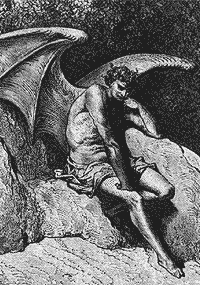 Despite everything that seems obvious about human nature, it took the species a surprisingly long time to come up with someone to blame for its own failings.
Despite everything that seems obvious about human nature, it took the species a surprisingly long time to come up with someone to blame for its own failings. Satan is a modern concept, as concepts go, dating back only to about the 3rd century B.C., when humanity woke up and realized that
a) The only way to understand people who disagree with you is to characterize them as unmitigated evil, and Satan appears in the Torah at a fairly early point, but not as we know him today. In the Old Testament, Satan is sort of the John Ashcroft of God's administration, an unpleasant figure who nevertheless works within the system. His first major supporting role comes in the Book of Job, when he prosecutes the title character with a series of hardships as part of God's anti-sin initiative. Other older references to Satan are equally ambiguous about his role. Around 400 B.C., however, people realized that there were political benefits to demonizing the disenfranchised, and the idea of an embodiment of pure evil became expedient. By the time of Christ, the notion was quite popular, and the teachings of Jesus are full of colorful anecdotes and aphorisms that helped cement the status of Satan as a fixture in Western religion. The serpent of Genesis was later retroactively determined to be this figure of Satan, and thus blamed for all of humanity's woes. The association also led to Satan's reputation as a teacher of secret knowledge. After all, the serpent in Genesis merely offers Adam and Eve the knowledge of good and evil. Even in the modern age of information control, God's reaction to this education initiative can only be seen as Draconian.
In the Old Testament, God curses humanity and the Earth itself for all time punish Adam and Eve for taking night classes in dualistic morality. He obliterates entire cities for their liberal views about sexual orientation and transforms onlookers into salt. He crams a boat full of people and critters, then kills the entire remainder of the world in a flood, forcing the survivors to repopulate the world through incest. He dumps his chosen people in the desert for 40 years, then gets pissed off when they try to vote him out in favor of a gold cow. In short, God is specifically identified as being the cause of bad things that happen to people. By the time of the New Testament, this view began to change. Jesus identified God as a loving father figure, which represented a rather abrupt departure from the previous view. So if God is good, why do bad things happen? At this point, the mythology of Satan become more fully developed. Its broad strokes eventually boiled down to the following structure:
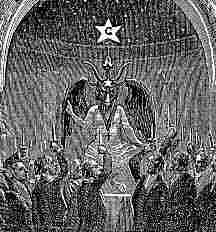
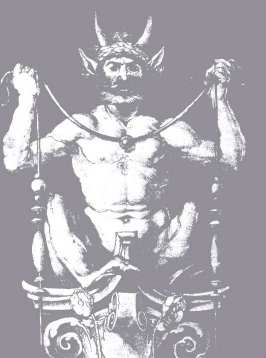 There's a lot of murkiness on various issues here, such as whether Satan actually has a chance in hell (so to speak) of winning his war, whether he's tolerated by God for some ineffable reason, or what.
There's a lot of murkiness on various issues here, such as whether Satan actually has a chance in hell (so to speak) of winning his war, whether he's tolerated by God for some ineffable reason, or what. After the original concept took hold, massive embellishments began. By the Middle Ages, Satan had become a figure of some literary weight and occult significance, operating under a number of aliases, including Beelzebub, the Devil and Mephistopholes. The Christian Church (and subsequently Islam, which also incorporated the figure) depicted Satan as a mighty tempter who offered power and pleasures in exchange for one's immortal soul. The church also attempted to associate pre-Christian Witchcraft practices with Satan, often draping such traditions in lurid tales of orgies, violence and supernatural power. Needless to say, these claims prompted a great deal of popular interest in Satan, especially among those rare individuals who liked sex, power and/or violence. Medieval Satanism and demonology was a flourishing hobby among the upper and middle classes, who dabbled and indulged while burning peasants for such unholy practices as putting aloe on cuts and making eucalyptus tea.
Hysteria about the influence of Satan continued well into the 18th century, when dozens of American women were burned as witches and accused of having preternatural sex with demons. The church also developed an elaborate framework having to do with possession, in which Satan entered the bodies of otherwise wholesome people, and had to be exorcised. In the 19th and 20th centuries, both God and Satan were on the decline. The rise of secular humanism had many people seeing both figures as quaint anachronisms. Satan started to make his big move from terror-inspiring malevolence to popular entertainer. Whereas earlier writers had built Satan into a figure of high operatic drama in works like "Faust" and "Dante's Inferno," the modern world reduced him to cartoon villain in movies like "The Omen" and Roman Polanksi's "Rosemary's Baby," or even comic relief, in "South Park" and "The Devil and Daniel Webster."
In fact, a little bit of Satan can be found almost everywhere in modern culture — except in Satanism, ironically enough, a modern movement founded by Anton LaVey, which claims it uses Satanic trappings to ironically underscore the importance its actual hedonistic secular humanism. (Contrary to popular belief, neither Aleister Crowley nor Jack Parsons were Satanists of any stripe.) About the worst thing you can do to a Satanist is accuse him or her of actually worshipping Satan, sacrificing babies, or being in any way evil. Doing this will provoke an self-righteous diatribe about relativistic morality which can potentially go on for several hours. It doesn't help to point out that they're just asking for it by calling themselves Satanists when they're really "nothingists," so it's better just to avoid the subject entirely. In fact, it's best to avoid all conversation with Satanists altogether and just stick to sex if at all possible.
Timeline
|
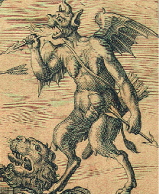 As the
As the  With the full-fledged incarnation of Satan as a mythological figure, corresponding theological concepts also arose, including
With the full-fledged incarnation of Satan as a mythological figure, corresponding theological concepts also arose, including 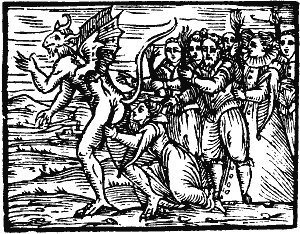 Despite this diminution of stature, Satan remained a popular leading man and occasional scary figure, in movies such as "Satan's Amazon," "Satan and the Woman," "Satan's Bed," "Satan's Black Wedding," "Satan's Blade," "The Satan Bug," "Satan's Cheerleaders," "Satan's Choice," "Satan Claus," "Satan Eats Lunch," "Satan in Prison," "Satan in High Heels," "Satan's Lust," "Satan's Mistress," "Satan Never Sleeps," "Satan's Sadists," "Satan's Sister," "Satan's Slave," "Satan's Touch" and "Nude for Satan."
Despite this diminution of stature, Satan remained a popular leading man and occasional scary figure, in movies such as "Satan's Amazon," "Satan and the Woman," "Satan's Bed," "Satan's Black Wedding," "Satan's Blade," "The Satan Bug," "Satan's Cheerleaders," "Satan's Choice," "Satan Claus," "Satan Eats Lunch," "Satan in Prison," "Satan in High Heels," "Satan's Lust," "Satan's Mistress," "Satan Never Sleeps," "Satan's Sadists," "Satan's Sister," "Satan's Slave," "Satan's Touch" and "Nude for Satan."